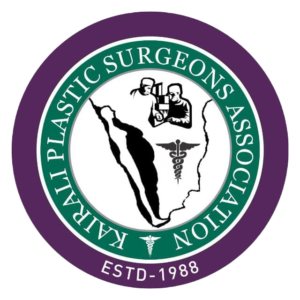Frequently asked questions ?
If you have any questions!
We encourage you to be fully informed about your health. Below, find suggested questions to ask your doctor. They may or may not relate to you, depending upon the disease or condition.
‘Plastikos’ in Greek means ‘Moulding’. A plastic surgeon gives form function of a deformed our debilitated body part. Example,the Deformed nose is corrected and that’s called Rhinoplasty,similarly deformed ear corrected called as Otoplasty.
Basically a plastic surgeon has undergone higher surgical training after successfully completing his general surgery. He undergoes rigorous training for handling delicate tissue. A plastic surgeon uses magnifying glasses to see the different minute details and uses specialized instruments to give that near perfect healing.
Plastic surgery is a problem-solving specialty. When there is challenging case or some complication, many specialties seek help from the plastic surgeon. But there are surgeries like aesthetic breast and abdomen or congenital deformities or cancer deformities that can straight away seek help from a plastic surgeon.
No, it’s cost-effective, if the patient comes directly, a plastic surgeon would be operating on him/her and mostly one procedure would require. Unfortunately, we get some patients operated on by different specialties, and then they have to shell more. Secondly, cosmetic surgeries are not always costly and these surgeries are done on those who seek beautification and cost is not the concern.
Yes, this population also could be benefited if they are well informed about the specialty. They can be directed to meet a plastic surgeon nearby. Today’s era with the best connectivity no village is far from a plastic surgeon. We aim at broadcasting about his speciality via the local newspaper, magazines, and TV news channels.
Yes, after any surgery there will always be a scar. It’s the process of healing. Plastic surgery isn’t magic. It’s a procedure where cutting and stitching both are involved. The only difference is most of the time a plastic surgeon will cleverly hide the scar. Example: in facelift the scar is within the hairline behind the ears so not visible. But in some unfortunate patients due to individual scar-forming tendencies, might have visible hypertrophic scars.
These are scars which are visible, especially on the face. They May be caused due to trauma or previous surgery. These are a bit tricky and difficult to treat. Lately, lasers are available to treat them. No creams actually help. It just works as a placebo. Finally, every patient should be informed that scar-less means lesser scar but won’t be totally scar free.
Yes,as every speciality would have such incidents,but plastic surgery,because it deals with cosmetic surgery, is frequently reported. None of those reports mentions if that patient was informed about the complications or not. Whether it was done by a qualified plastic surgeon in a reputed hospital. If they would have done so,then it wouldn’t be in the news,isn’t it?


Surgeon
Of late many doctors of different specialties tend to call themselves or advertise themselves as plastic surgeons or cosmetic surgeons or aesthetic surgeons, because they may be doing some procedures which a cosmetic surgeon or plastic surgeon also does. By that alone one will not become a plastic surgeon or cosmetic surgeon. Constantly there are allegations.
A true surgeon is one, who not only knows how to do surgeries, but also is well versed with the problems or complications that may arise after a surgery and to treat them effectively.
A plastic surgeon’s academic journey is as follows. He or she has to :
- Get MBBS degree, which is a 5 ½ years course in India or equivalent to that recognized by Medical Council of India
- Get a post graduate degree in General Surgery, Orthopedics or ENT which may be a three years course of MS or DNB or an equivalent to that recognized by Medical Council of India.
- After that, the surgeon undergoes another three years course in Plastic and Reconstructive Surgery which may be MCh or DNB or an equivalent to that recognized by Medical Council of India.
- The doctor may also apply for Primary DNB in Plastic Surgery directly after his under-graduation, which is usually a six years course.
Only after this one can call himself /herself or advertise himself /herself as “Plastic Surgeon” or “Cosmetic Surgeon”.
NB:A person seeking a treatment from a doctor has the fundamental right to know the doctor’s qualification and experience. So MCI actually gives directive to all doctors to exhibit their degrees and certificates of qualifications in their consultation room so that the patients will be able to see..
Even though during their course of MCh or DNB, all plastic surgeons are exposed to various subspecialties to varying extents, depending upon their institution of training, in order to get in depth practical knowledge, many such plastic surgeons further go for specialized training in subspecialties such as “Cosmetic Surgery”, “Hand Surgery”, “Microsurgery”, “Non invasive aesthetic procedures” etc. Such training is pursued in centers which are centers of excellence in India or outside India for quite a long duration. Most such centers issue a certificate, which is a credible credential.
Going to unqualified, self declared, fake “plastic surgeon” or “cosmetic surgeon” can be disastrous and sometimes life threatening.
